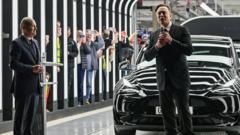In recent days, several European leaders have publicly voiced their concerns regarding tech billionaire Elon Musk's political maneuvers, particularly in Germany where Chancellor Olaf Scholz has been a primary target of Musk's social media criticism. Musk has labeled Scholz an "incompetent fool," urging for his resignation, as he prepares to host a discussion with Alice Weidel, the head of Germany's far-right, anti-immigrant AfD party, on his platform X. This move is perceived by many politicians as unwarranted interference in Germany's upcoming federal elections set for February 23.
Chancellor Scholz maintains a calm demeanor amid the uproar, suggesting to "stay cool" and refrains from engaging with Musk's provocations. However, leaders from other European nations have not been as restrained. French President Emmanuel Macron expressed astonishment over Musk's involvement in electoral processes, noting how unbelievable it is for a principal social media owner to back a new international reactionary movement and directly intervene in elections.
Concerns over Musk's influence extend to Norway and Spain, where leaders have flagged apprehensions regarding his significant economic power and access to platforms influencing public opinion. Spain's government has called for digital platforms like X to maintain neutrality and eschew political interference. Musk’s recent claims about crime rates linked to immigration in Norway and Spain, alongside his bombastic posts attacking UK Prime Minister Keir Starmer, have fueled criticisms that he is spreading misinformation across Europe.
While notable leaders such as Italy's Giorgia Meloni and Hungary's Viktor Orban have reportedly embraced Musk's support, German leaders are particularly uneasy given the AfD's rising popularity in polls. Musk's frequent endorsements of the AfD's policies have prompted a backlash, with German officials like Robert Habeck declaring, "Hands off our democracy, Mr. Musk." The financial implications of such endorsements were also raised by Christian Lindner, leader of the liberal FDP party, suggesting that Musk could be attempting to create a favorable political landscape for U.S. interests.
There is a simmering debate within the European Commission regarding Musk's livestream with Weidel, as officials warn it could give her a critical edge in the elections. Although the EU's Digital Services rules do not outright ban such engagements, there are warnings against preferential treatment for specific political actors.
In Italy, Musk is simultaneously negotiating a deal with the Italian government to provide Starlink satellite communication services, which raises eyebrows among opposition figures concerned about Musk's affinity for far-right politics in Europe. Carlo Calenda, a centrist politician in Italy, voiced his objections to the prospect of depending on Musk’s entities for secure communications, especially given his perceived meddling in European politics.
Musk's simultaneous engagement in political discourse and business dealings across Europe raises questions about the influence of tech billionaires on national politics and the implications for democracy within the continent. For many European leaders, Musk’s actions exemplify a concerning trend of foreign interference in domestic affairs, amidst the backdrop of concerns over misinformation and the integrity of electoral processes.






















